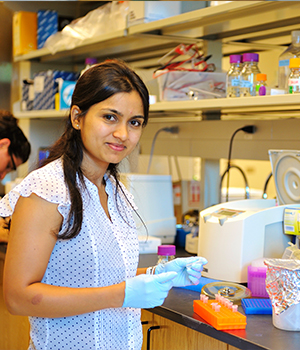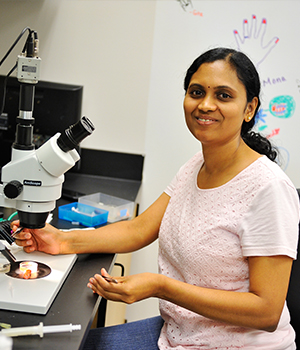Tanja Godenschwege
Education
- Ph.D., Bayerische Julius-Maximilians-Universität Würzburg, Germany
Research Interests
- Cellular basis of neurological diseases
- Neurodegeneration and regeneration
- Axonal transport and injury signaling
- Axon guidance and synapse formation
Research Description
My lab uses the Drosophila melanogaster as a model to understand brain development, function and maintenance. In the nervous system the function and signaling mechanisms of many genes are evolutionarily conserved from flies to humans. We use anatomical, electrophysiological, molecular and genetic tools as well as live imaging of axonal transport to characterize disease-associated genes at cellular and organism level to determine how they contribute to developmental processes and neuronal survival. Currently in the lab we are characterizing several conserved genes such as APP/APPL, L1-CAM/Neuroglian and attractin/Dsd. These genes are of relevance to a variety of neurological disorders and diseases such as Alzheimer’s, regeneration and degeneration, cancer, and aging.
A second focus of the lab is to discover novel drugs that affect the function of the nervous system. The venom of cone snails is a complex mixture of bioactive small peptides and isolated conopeptides known to elicit a wide range of physiological effects. They are used not only to study the physiological function of neuronal and muscular target molecules but are also powerful therapeutic agents for a variety of neurological disorders and conditions. In collaboration with Frank Mari's Lab (now at Hollings Marine Laboratory) we have developed a novel approach to screen conopeptides for biological activity in vivo.
Recent Publications
- Tyrone Penserga, Sirisha R. Kudumala, Richelle Poulos, Tanja A. Godenschwege (2019). A Role for Drosophila Amyloid Precursor Protein in Retrograde Trafficking of L1-Type Cell Adhesion Molecule Neuroglian. Frontiers in Cellular Neuroscience, 12 July, https://doi.org/10.3389/fncel.2019.00322.
-
Yurgel, ME, Kakad, P, Zandawala, M, Nässel, DR, Godenschwege, TA, Keene, AC (2019). A single pair of leucokinin neurons are modulated by feeding state and regulate sleep–metabolism interactions. PLoS Biology, 17(2), e2006409.
- Priyanka P. Kakad, Tyrone Penserga, Blake P. Davis, Brittany Henry, Jana Boerner, Anna Riso, Jan Pielage, and Tanja A. Godenschwege (2018). An ankyrin-binding motif regulates nuclear levels of L1-type neuroglian and expression of the oncogene Myc in Drosophila neurons.
J Biol Chem
.
Nov 9; 293(45):17442-17453.
- Sirisha R. Kudumala*, Tyrone Penserga*, Jana Boerner, Olesya Slipchuk, Priyanka Kakad, LaTasha H. Lee, Aater Qureshi, Jan Pielage and Tanja A. Godenschwege (2017). Lissencephaly-1 dependent axonal retrograde transport of L1-type CAM Neuroglian in the adult drosophila central nervous system. PLoS ONE. 12(8): e0183605. *equal contribution. https://doi.org/10.1371/journal.pone.0183605.
Scholarly Activities
See all publications




